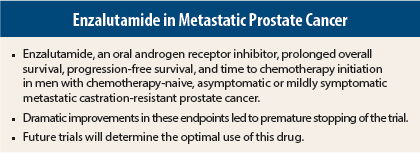Encouraging results of the large phase III PREVAIL trial represent another positive milestone for men with metastatic castration-resistant prostate cancer. Enzalutamide (Xtandi) improved overall survival by 29% and reduced the risk of radiographic progression of disease by 81% in men who had not received chemotherapy.
An interim analysis of the trial data in 2013 was so favorable that the Independent Data Monitoring Committee halted the trial prematurely and offered all placebo recipients enzalutamide. Complete trial results were reported at the 2014 Genitourinary Cancers Symposium in San Francisco.1
Potential Treatment Standard
“In my view, enzalutamide provides clinically meaningful benefit for men with [metastatic castration-resistant prostate cancer]. It is approved by the FDA in men previously treated with docetaxel, but not yet approved for use prior to docetaxel. If it does get expanded approval for this indication, it is likely to become an important standard option for use in patients with asymptomatic or minimally symptomatic advanced prostate cancer,” said lead author Tomasz M. Beer, MD, Professor of Medicine and Deputy Director of the Knight Cancer Institute at Oregon Health & Science University, Portland.
Between September 2010 and September 2012, PREVAIL included 1,717 patients with asymptomatic or mildly symptomatic metastatic castration-resistant prostate cancer who had not received previous chemomotherapy. They were randomly assigned to receive enzalutamide at 160 mg/d or placebo.
For the coprimary endpoints of the trial, enzalutamide reduced the risk of death by 29% (hazard ratio [HR] = 0.706, P < .0001), and reduced the risk of radiographic progression by 81% (HR = 0.86, P < .0001). Overall response rate according to imaging of soft-tissue disease was 59% with enzalutamide (20% complete responses and 39% partial responses) vs 5% in the placebo group (P < .0001).
Importantly, enzalutamide delayed the need for chemotherapy by a median of 17 months: Median time to chemotherapy was 28 months in the enzalutamide group vs 10.8 months in the placebo arm, representing a significant 65% reduction (HR = 0.35, P < .0001).
“This is important from a pragmatic perspective. Many men don’t want to take chemotherapy, especially if they are asymptomatic or mildly symptomatic,” Dr. Beer commented.
Subgroup Analysis
Eleven percent of men enrolled in PREVAIL had visceral metastases. These men are typically excluded from clinical trials in this patient population. A post hoc subgroup survival analysis of progression-free and overall survival showed that the hazard ratio for patients with visceral disease is generally similar to the overall population.
“Results in the subgroup analysis for visceral disease were not discordant with the rest of the study results,” Dr. Beer said.
The safety observation period was three times longer with enzalutamide vs placebo, reflecting longer duration of treatment in this arm, he continued. Enzalutamide was well tolerated after 17 months of treatment, with the most common side effects (seen in ≥ 20% of patients) being fatigue (36% of enzalutamide patients, 26% of placebo patients), constipation (22% and 27%, respectively), back pain (27% and 22%), and joint pain (20% and 16%).
Any adverse event was reported by 97% of the enzalutamide group and 93% of placebo patients. Grade 3 or higher adverse events were reported in 43% of the enzalutamide group vs 37% of the placebo group. About 6% of patients in both arms discontinued treatment due to adverse events, reflecting good tolerability.
Abiraterone or Enzalutamide?
Dr. Beer said that both abiraterone (Zytiga) and enzalutamide have shown benefit in docetaxel-naive patients with metastatic disease, but at present there are no head-to-head comparisons to guide treatment selection.
“This study did not compare the two drugs head-to-head, so I won’t try to compare results of trials,” commented Dr. Beer. “But there are some noteworthy differences between trials of the two drugs. For example, PREVAIL included 11% of men with visceral metastasis, while these patients were excluded from the abiraterone trial.”
He cited the following practical considerations: Abiraterone requires steroid coadministration whereas enzalutamide does not; abiraterone therapy entails dietary restrictions, whereas enzalutamide therapy does not. “These subtle differences may play a role in clinical decision-making for individual patients,” Dr. Beer continued.
“I won’t make a blanket statement. We have two active drugs for patients. My hope is that our future studies will further define which patients benefit from which approach. For now, we have encouraging results for both drugs and we will treat patients by making decisions one at a time,” Dr. Beer stated.
Further studies comparing these treatments and sequencing them are needed, as well as studies earlier in the disease process, Dr. Beer noted. He added that the drugs will be studied in sequence and in combination and in earlier stages of disease. “We will see a continued evolution of how these drugs are used,” Dr. Beer predicted. ■
Disclosure: Dr. Beer has received research funding from Astellas Pharma, Cougar Biotechnology, Janssen Biotech, and Medivation. For full disclosures of the study authors, visit abstracts.asco.org.
Reference
1. Beer TM, Armstrong AJ, Sternberg, CN, et al: Enzalutamide in men with chemotherapy-naive metastatic prostate cancer (mCRPC): Results of phase III PREVAIL study. Genitourinary Cancers Symposium. Abstract LBA1. Presented January 30, 2014.



